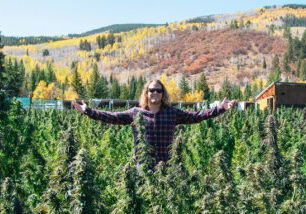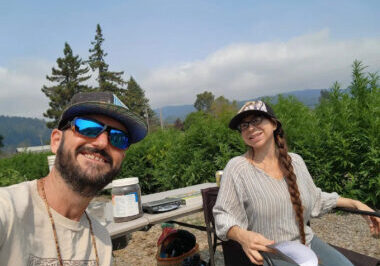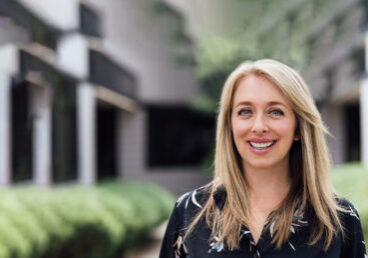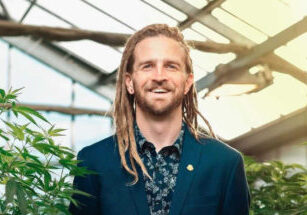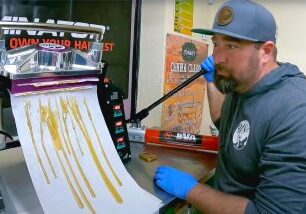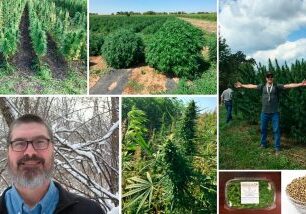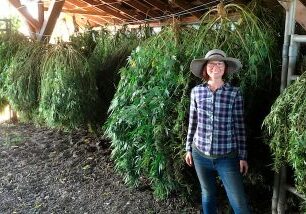In this episode we chat with Nikka T, founder of Essential Extracts, Cannabis Cup Judge, Ganjier teacher, and much more.
Our hosts for this episode are Reed Preston, founder of Preston Hemp Co, and Dana Mosman, co-founder of Triminator.
Transcript
Reed Preston: Welcome to the Own Your Harvest podcast. This is the 10th episode of our podcast series. I’m Reed Preston, founder of Preston Hempco and an ambassador for Triminator. I’ll be hosting this series along with our Triminator co-founder Dana Mosman. This episode we’re going to be chatting with Nikka T, founder of Essential Extracts, Cannabis Cup Judge, Ganjier teacher, and much more.
Dana Mosman: Awesome. Thanks for the intro. Super excited to talk to, one of the pioneers of solventless, if not the Pioneer solventless. So, Nick, thanks so much for joining us.
Nick Tanem: Yeah, thanks for having me, y’all.
Reed Preston: Yeah, man. Where are you out of today?
Nick Tanem: Today, I’m in Colorado. I just flew in here last night. I actually haven’t even showered yet. Because I got 40 hours in town before I touch road again. So, it’s been kind of a madness just catching up and cleaning the house and resetting gardens and doing everything I can while I’m in town before I dip begin. That’s the vibe right now.
Reed Preston: Right on.
Dana Mosman: A lot of travel, huh?
Nick Tanem: Yeah.
Reed Preston: Yeah. Where are you headed next? You’re back. You said you’re back for 40 hours or so. What do you got next on your list?
Nick Tanem: I’m heading to Oregon, Southern Oregon for a console. This client I’ve had for probably a little over a year now, and they’re finally fully built out. Everything is running, operational. And they’ve brought me in to do some in-person trainings, training the staff on the SOPs, get them going on the off spray, get them going on the presses. And yeah.
Reed Preston: Nice, man. I guess before we get too deep into this, I don’t know for those listening who don’t know who you are or aren’t familiar with your brands or anything, could you kind of give us a little backstory on how you got involved in the industry and sort of what you got going now, what led to that?
Nick Tanem: Yeah. So, I grew up in Northern California. Cannabis was really prevalent in my upbringing, and it was accepted into my family, for the most part. I got involved in cannabis sales at a young age, really. And throughout all that selling, I always wanted to be more in a legal position, a sleep at night position is kind of what I called it. Eventually, I had a kid and it pushed me into really, really needing that sleep at night. I was done hiding, done getting robbed, done getting, dealing with legal situations, if you will. And Colorado was the first place to really allow protection in a regulated environment.
So, I moved back to Colorado, I started Essential Extracts, which was one of the first licensed solventless companies in the United States, one of the first tax paying cash companies in United States. Back in 2010, like 2009, we were starting things moving. By 2010, we were operational. And we operated in Colorado for over… yeah, for about a decade. And now I’m really… I’m focused on Essential Extracts, my brand. It’s still operational in California right now. But really, I’ve pivoted to more of a teacher role in all aspects from consulting, to teaching on the road to judging to assessing. And that’s kind of what I’m doing now. Just to give a short background. I do road and I teach.
Reed Preston: Nice. Yeah. I was… I remember we met back at the class and Oklahoma. It was the Experience Project by 9180OG, that’s the first time I met you. And yeah, you kind of told some of your story there. I thought it was really rad. And I remember you mentioned kind of finding the word solventless in this industry. Can you tell us a bit about that story, kind of how that came about?
Nick Tanem: For sure. No, I’d love to tell that part. So, late 90s, early 2000s, butane hash oil started to become popular. I’m sure people were playing around with it before then, but we started seeing advertisements in the back of High Times for butane hash oil. And it was called a number of things in the onset of that movement. But for the most part, people were open blasting back then. And they were creating things like honey oil was one of the first terms. One of the second terms was ear wax, and so on, shatter batter, yada, yada, yada. And we saw that movement, and I saw that movement kind of coming into play, and I wanted to play with it as well.
So, I was blasting butane on my back porch from Boulder, Colorado in the mid-2000s, and wondering what I was doing reality. We didn’t know a lot about it back then. And I was doing this, and we were making this gold, beautiful looking, but still kind of volatile feeling honey oil for our friends. And I was like, “Well, I love how it looks compared to the bubble hash I’d already been making for years prior. But what’s really in it? What kind of chemicals are left behind?” And so, I kind of went on a journey of research, looking into what we were doing, looking into mercaptans, looking into the heavy metals that were left behind and the petrochemicals and yadda, yadda, yadda, a bunch of things we were finding basically.
And so, to cut to the chase, I wanted to recreate a product that looked like that, that looked like this gold, viscous honey oil, but without the use of chemical solvents. I wanted to recreate those colors and those consistencies in the way that they were being consumed. Because this is really the onset of skillets and dabbing in general. We had a bunch of different ways to heat up a device and vaporize our hash oil before we came to the slurpers of today, if you will. And that technology was coming along, you know. as all this butane technology was coming along. So, we wanted to recreate something that not only looked like, smelled like, tasted light, but also reacted like butane hash oil.
And so, I started playing around, playing around in the lab playing around in the barn. First it was the barn, and then it became more of a cold environment. We started controlling the temperature and the humidity. Then we started controlling the water. We started controlling the input material from the moldy, degraded material that was left on side of the road to actually getting close trim, the sugar leaf. From there, we started getting whole plant, fresh material, then fresh frozen.
And before we really even got into the fresh frozen stage of things, just by controlling a few of the variables, we started re-creating a product that didn’t look like bubble hash anymore. It started to look more like the butane hash oil. It didn’t have the same shelf stability, for sure. But we started getting more of those gold colors. We started getting that year wax type consistencies, if you will, compared to a pliable malleable, black or brown bubble hash. We started having issues selling it almost. We would bring it to a dispensary in Colorado (or I would), and they would be like, “Oh, this doesn’t look like the bubble hash on the shelf anymore. What do you call this?” And I’m like, “Oh, it’s just bubble hash. It’s just water hash.” I think I was already staying away from the term bubble hash. I think I was going more with like water hash initially. And it caused confusion though. And I had different microns. And it was definitely a cleaner version of what was on the shelf, but it was causing confusion.
So, I had this amazing run that we made. I think it might have been one of the Boston Bling runs or something that just came out ridiculous. And I call over my buddy at the time, who was one of the first influencers if you will, Paul Tolkien. He was a YouTube phenomenon back then. I called him over and I’m like, “Bro, you gotta check this stuff out. It melts on the nail, and it barely leaves anything behind. It’s dabbing like to BHO. It looks like it. Gotta come check this out.” He comes over, and this was a time where earwax was a popular term. And really, it’s Paul Tolkien that I give the credit to. Paul Tolkien was like, “This is solventless wax.” Because I was asking him, “What should we call this?” He was taking a dab of it and it barely left any residue. It tasted very similar to the BHO… and the earwax, sorry. So, “What should we call this?” he says, “Solventless wax.” I’m like, “Right on. Let’s run with it.” And I promoted the shit out of it. I was the guy behind it. I was the one making it, and I’m saying, “This is our solventless wax.” And I’m putting it on dispensary shelves throughout Colorado.
And eventually, that product wasn’t the most shelf stable. It would have that kind of waxy consistency, but eventually it would kind of dry up. We were leaving a little bit too much moisture in it. And then other consistencies became popular, like Shatter. And we recreated Shatter. And then it wasn’t just solventless wax, we were making solventless Shatter, and we were making other consistencies. And that’s when I really decided to make ‘solventless’ the overhead umbrella term. And that’s kind of what started the education. That’s what started the community surrounding this.
Initially, right off the bat when I coined the term solventless for this particular product, if you will, or product skews… because of course the term ‘solvent’ and ‘less’ existed before this. And even, I think very much simultaneously, as us promoting this new method of making hash and controlling these variables, I start seeing solventless on the packaging of essential oils that were made with steam rather than butane and things of that nature in it. It wasn’t just a movement that I was pushing. I feel like there was a big movement coming out of like essential oil factories pushing solventless and more natural and safer ways to go about it. Maybe they got it from me, I don’t know. But solventless was the umbrella term that we created really, Paul Tolkien and I, and continue to push forward.
And yeah, in the very beginning, we kind of held it tight, I was like, “Oh no, I’m using this term to really separate my product from the rest. I have solventless wax on the shelf.” And around the same time, we started developing brands. So, get into a little bit later in the 2000s, and I have now Essential Extracts and solventless wax and solventless shatter under my brand. So, it was a distinguishing factor for my brand, but I also needed everyone to learn. So, very soon after I kind of coveted the term and coveted some of the technology. I wanted to immediately share it all. I wanted everyone now to use the term solventless. And I wanted to teach people what I was doing to create this solventless.
So, that’s kind of where the term came from. And that’s, very soon after that it exploded. I saw other brands repping solventless on their chest, when I had a solventless shirt made right before. And it became a huge thing. It became a community. We had this extract artists platform, which was one of the first educational platforms surrounding around concentrates on Facebook period. There are a lot other groups, Facebook groups that came after. But we were really the first. I had the balls. I was the one that was contacting the Department of Revenue contacting people saying, “Hey, I want to do this illegally.” And then we were putting out the information on a wide level. So, people caught on. And I was really surprised. And I’m still surprised today to see how many people really grasped that word and pushed this movement. Because initially, I didn’t think it would become a movement. We were just creating the term to separate ourselves from the rest. And now it’s really, it’s a movement. It’s a community. It’s taking over the industry.
Reed Preston: Yeah, it definitely is. Dana, I know you had like a question kind of about…
Dana Mosman: Oh, I mean, I don’t know, that’s cool. That’s a super cool, right? To like start… and you start like by protecting it a little bit. You’re like, “Oh, this is mine.” And then you’re like, “Oh, actually it’s big,” kind of bigger than you, right?
Nick Tanem: Exactly, yeah, bigger than I could handle.
Dana Mosman: But it also probably, I mean, it’s kind of like you need them to know the category.
Nick Tanem: Well, and for sales, yeah, I wanted to educate the bud tenders. I wanted to educate people the differences that we were really doing, the type of water we were using, the type of ice we were making. And that that input material, a lot more went into it than just your standard bubble hash. And we wanted to educate that to the consumer. We wanted to educate that to the broker, to the dispensary, to the retail. We wanted to shout it all around. And still today, we’re pushing hard. And I’m pepped right up. I haven’t let up the gap at all.
Reed Preston: Yeah.
Dana Mosman: For sure. So, I mean you obviously started kind of doing the education piece just out of necessity. And now you’ve kind of shifted more into that as a focus. Kind of tell me where a light went off in your head about that, like in terms of, “Oh, hey, this is another avenue that I can take with this.”
Nick Tanem: Yeah. No, good question. Because really the whole thing for me, and in Northern California initially it started because I wanted to smoke more hash.
Dana Mosman: To be honest, to be honest.
Nick Tanem: I wanted to smoke more hash. So, I learned how to make hash. That’s day one how it started. But once I had that skill set, that not a lot of my friends had to make a specific type of hash, I wanted as many people to experience this echelon as possible, plain and simple. So, when I couldn’t sell as much by myself, I wanted to roll into the regulated industry, not only for the protection, because I wanted to reach more clientele. Eventually, that medical industry started getting smaller, if you will. And to me, recreational didn’t just mean for fun, recreational as wellness is well. And when I was told that we could go recreational and reach even a broader
audience, have people from out of State come to our dispensary and purchase this medicine (for a lot of people still today, it’s medicine), I saw that I could get to even more hands. I could help even more people with this proper of a product.
So, that’s been my whole goal from day 1. And eventually, Colorado kind of closed in on me. Big money came in. I got screwed out of a few situations. And I’m like, “Well, how do I continue on this legacy? How do I continue to get this high product, high-end product in the more hands? I’m going to teach. I’m going to help other brands lot.” There wasn’t competition for me in the beginning, because it was all about education. And the more people are educated, the more they spread that knowledge, and the more my products sold off the shelf, plain and simple. So, there’s never been competition for me. So, I’d rather just continue teaching everyone and as many people as I can. And that’s really why I’ve pivoted more into a consulting role rather than even focusing on my brand as much, which I’d like to put the time into my brand. And I do. But I have been focusing a lot on the teaching role, because I can still get more product into more hands if I teach.
Dana Mosman: What level do you think…? I mean, obviously, there’s a whole variety that when he started, everyone was like at ground zero, basically. Where is the average…? I guess it depends on the market, but like, where’s the average, kind of like where do you meet the whoever you’re educating? What level do you…? Do you feel like the average has moved up? Or is it still just like kind of ground zero in most places?
Nick Tanem: It depends on the client. It depends on the class. With my consulting, I really consult from seed to sale. So, I’ve ran everything in the industry from cultivation, to processing, to retail. And I have my specialties I’d say processing is definitely my specialty. And I help, I bring in some other my homies for some of those other parts. But sorry, I lost my train of thought. What was the question?
Dana Mosman: Where do you…? Like, what level is the current?
Nick Tanem: Yeah. So, I see people from every single level. Because we’re consulting from seed to sale, we see people that haven’t built out yet, their facility. We see people that just have real estate. We see people that are interested in going into the industry. So, really all levels of the playing field. I’m not trying to weed them out at this point. But I also do teaching for the Ganjier program up in Humble. And that’s really focused on assessment. It’s very much like a Sommelier program, but for cannabis. And in that program, we see all different levels of the industry, people in the industry, people trying to get into the industry, people that are intrigued by cannabis, people that have been smoking for their entire life that want to hone in on their skills, people who want to refine their palate. People that are head of sales for huge MSOs that are already well established in our industry, trying to gained some more knowledge that they can then pass on to the rest of their staff and their SOPs. We see so many different people. And I see, personally, people all around the world. And I’ve been doing a lot of work in South America this summer.
And so, what’s our ground zero might not be there ground zero. And South America has been making hash for a lot longer than the United States in all reality, but different types of hash. And they have different variables that they’re dealing with in the mountains of Claca and Columbia compared to a nice, regulated lab here in the States. So, we deal with all kinds.
Reed Preston: Right. On the note of the Ganjier program, like how long are those courses? And I think I saw something where I don’t know if they just released it online due to COVID, or is
that like an option now too kind of? I don’t know much about the program. I’d like to know more about it. I’ve been hearing about it more. And obviously, I know that you’re a teacher there. Like, would love to hear what you do, like if you’re working specifically with solventless. Really, everything about it.
Nick Tanem: Yeah. So, I’m one of the original council members. And I’m extremely blessed to be a part of this program and platform. There’s some amazing heroes of mine that are also council members that are my peers that I’ve looked up to. One of which has passed away. Frenchie, rest in peace. But everyone from Frenchie to Omar Figaro who wrote the law in California for the most part, to Patrick Soil King, to Aaron, who runs retail in Washington. Derek Gilman is kind of the leader of the pack, if you will. And we’ve got the organization and help from Green Flower Media that’s really powering the entire program. We have a new campus now up in Humboldt. Thanks to Derek for finding this amazing space. So, the Ganjier program is really an assessment program, first and foremost. We wanted to create standardization in assessment for cannabis. So, very much like the Sommelier program, we are the Ganjier program for cannabis. So, instead of wine, we focus on cannabis.
There’s also an online portion to the class that you would generally need to complete before the in-person training start. And the online portion covers everything in the cannabis industry on a broad scope, from history, to processing to law, etc. There’s a lot more to it than I’m even going to mention here. And really gives you a nice background of the industry, and also gives a lot of love and credit to the craft farmers. And that’s a big part of the program, as well as bringing back that love to the community in the people that started it, getting the craft farmers the love that they deserve. Because the price points of cannabis have been just plummeting. And it’s hurting a lot of these family farms. And so, a lot of our goal is also to bring them back up. And I’m working with a ton of them as well through the program, as well as through the licensed regulated system in California as well.
So, the Ganjier program is online as well as in person-training. The in-person-training consists of 2 days of in-person training. The first day, we do appearance and aroma assessments. And the second day, we also… we actually started with a farm tour and then we end it with flavor and experience, and kind of go over the different factors and variables within those categories. And the farm tour is a really nice benefit to the whole thing. We get these students from all around the world. Some of which have no experience whatsoever. Some have never seen a cannabis plant growing. Some grow professionally. So, all walks of life. But it’s really great to get everyone on the farm. I oftentimes do a try come tutorial, so to bring in a little bit more of that solventless expertise that I bring to the table. Other the members will bring their expertise. Aaron doing the retail and some things of that nature as far as the Ganjier demeanor, and the protocol. And kind of yeah, bring all that together and hang out in Humboldt for a week. Because I generally, myself, I do 2 classes in a row. Because not only am I on the council, but I also do the in-person trainings each and every month. Every once in awhile, I’ll miss one. But I’m pretty much consistent on every month I’m up there.
Dana Mosman: Nice. That’s been like well adopted. I mean, I’ve heard about it forever. And at this point, it sounds like a pretty broad spectrum of people coming in, or is there more influence coming from like MSL level, small farms, all across the board?
Nick Tanem: All across the board. Like students from Germany, students from Colombia, students from humble right there in town, students from the Bay Area, students from all over the world, East Coast, West Coast. So, there’s been a lot of East Coast students as the East Coast kind of emerges in that market, as licenses are being handed out, some of our students are
getting licenses. So, yeah, all walks of life. And it’s been really received well. We were all a little nervous. We put a lot into this program before we even launched it. We worked on it for I think over 2 years before even launching it. A lot of hours from all of the council went into really clarifying the system. And it’s an ever-evolving system as well. So, we’re not saying that it’s the best. But for the options that are out there, I think it really goes above and beyond anything else that’s available.
Reed Preston: That’s awesome. Aside from Ganjier, like… I met, like I know we met at the class in Oklahoma. And do you have any other like, kind of, I don’t want to say smaller classes, but like do you have any other classes like that going on? Like anything coming up?
Nick Tanem: Yeah. So, like small scale like that, actually, I’ve been building out a little R&D/training facility where I’ll be able to do private instruction. I’ll also be able to do some small, small groups, really intimate classes. Like, me and 4 to 5 students type of intimate classes like that, or maybe up to 8. But that’s the type of miniature fully built to spec R&D training facility that I’ve been working on, as far as like FRP walls and everything being to code etc. So, that will be in action soon. It’s taken a lot longer to really get to actual go mode in there, but it should be really, really soon. I have plumbers in my house right now, are in the property right now. constantly working on these things. So, that’s in the works.
I’m on private consults to. I’m heavily booked on private consults. I book about 3 to 6 months in advance. And that would be one on one, or me with a staff training them on SOPs, which I’m heading to Oregon to do this week. And I’ve got 2 more that I’m trying to fit in before the end of the year. So, yeah, in between the larger scale group classes, I just did one with SRTA testing in Colombia just last month or 2 months ago. It’s hard to keep track. But very recently, we did a class out there. And I’ll continue to do those types of classes and continue to do the one-on-one trainings and private consulting as well.
Reed Preston: Nice. So, you got any…? I know you do judging as well, right? Like you judge Cannabis Cups. Like I know you’ve been a judge for High Times, right? All sorts of stuff. Like, what do you got going on in that world? Like, do you have any cups coming up, or…?
Nick Tanem: Well, I just got done… well, I’m trying to finish it off. I’m like really just trying to lay low for a little bit. This summer has been madness. We… yeah, I personally have judged, I don’t know, over 20 cups this summer. So, I’m going to try and do a little bit less of the cups in all reality moving forward, because it took up a ton of time this summer. But I do have another cup that we will be judging in Colombia again in February. It’s on the books. As well as I put my hat in the ring again for an Emerald Cup judge. I was an Emerald Cup judge for over a decade. And last year was the first year that I was not an Emerald Cup judge. I got some amazing other judging opportunities in the Canary Islands, and all throughout the world. But I’m hoping to be an Emerald Cup judge again this year. I like that that spot over there.
Dana Mosman: So, I mean, obviously a lot of people would like to know what goes on in the mind of a cup judge. Like, when you’re going through that experience, what are you…? Can you take us through that process a little bit? Like, what are you thinking about or experiencing?
Nick Tanem: Yeah. To really be a proper judge you need your space. Set and setting is really, really important. So, having all of your utensils at hand, whether you’re judging concentrates or judging flowers, just having everything you need in front of you. And whether you’re judging with a group (because I’ve sometimes been put into live judging situations where I have to judge the group), or whether you’re judging privately, the set and setting can definitely be a variable. But
you can control it by having your own utensils having the same rolling papers you use each and every time having your specific type of rig and daver and slurper set up for the exact temperature with your turf timer. It takes a lot of tools to really be accurate. And it takes knowing your tools. So, I think the tools and the setting kind of go hand in hand.
It’s a lot to distinguish experience when you’re judging live or when you’re judging a ton of entries. So, oftentimes, that’s really the hardest category. But we look for outliers. We look for those extreme ones, those ones where I’m like, “I’m going to fit 7 dabs in today to be able to get through these 70 dabs in 4 days,” or whatever it may be. And I only got to 5, and I noticed myself waking up on the couch like, “Whoa, what happened? Number 5 was strong.” You know what I mean? So, we [inaudible] outliers, or you smoke one and you get a little anxiety, or you feel like a coffee-like buzz or sensation. So, we really, we noticed those outliers.
It’s a blessing to get to be a judge all around the world, to have my opinion be recognized, if you will. But it’s also a lot of hard work. People don’t realize that part. Flying across the world and being landed on an island somewhere with not all the tools you may need right at your fingertips. You have to go find the butane. You have to go source something here and there. And you’ve got to find all the things that you need once you land somewhere. And sometimes, they just put you right into it. They’re like, “Here’s a little appetizer basically. Start judging.” And it can be draining on the body. Sometimes we’re judging cups on the other side of the world where the cleanliness of the cultivation might not be as good. Maybe they’re still using pesticides. I smoked something and it gives me a lung infection. This is real life. I’ve gotten lung infections from judging cups. So, it’s a lot on the body, but is truly a blessing to be in this position.
Reed Preston: Yeah. The whole flying across the world, landing on an island to judge them. Cannabis didn’t sound too bad to me. But the…
Nick Tanem: Yeah, it’s good. But sometimes, they want you to get right into it after an 18 or 20-hour flight.
Reed Preston: Right.
Nick Tanem: And it’s just like you got to kind of get on your game, get on it quickly. And maybe that’s why I keep getting booked because I’m good at that. I can hop on a flight for 20 hours, get off and go right to work.
Reed Preston: Get right to it, yeah.
Nick Tanem: For me it’s work, because you have to sit in one spot for a number of hours and just sample, sample, sample, clean, sample, clean, sample, wait for rigs to cool down, sample. It’s a lot. And like, it’s almost like if you want us to be a proper judge, you should provide some of the amenities, bringing food, bringing drinks, bringing those things to the table so that we can continue judging without taking a break.
Dana Mosman: It’s like cannabis confidential or something, like Anthony Bourdain, like inside the tough life of the judge, right? Like behind the scenes.
Nick Tanem: Hey, it’s amazing. I get to smoke terps from all around and find flavors. And I taste something at the Emerald Cup, and I now need to find who grew that. And I become friends with that person. And this is real. This has happened a number of times where I’m like, I taste
something, I’m like, “Oh my God, I need to know what that is. I need to know who grew it.” And I’m blessed to get that opportunity to meet that person and hold the vibe, and maybe sometimes even get some of that product. That’s really, really cool, because I am truly a smoker still. I consumed quite a bit.
Reed Preston: What was… what were the Canary Islands like? I was just chatting with someone from over there, and it sounds pretty rad over there. Those are the islands just off the coast of Spain, right?
Nick Tanem: Yeah, like the Caribbean side of Spain.
Reed Preston: Okay.
Nick Tanem: And it’s got a similar vibe to I’d say Barcelona and Europe. It’s kind of got like this UK and European energy there. But it also has like a Caribbean Latin Island type of energy. And it’s nestled right on the beautiful coast. You have what they call Colima.
Reed Preston: Uh-huh.
Nick Tanem: Which is like the dust storm that comes in from the African deserts, the Sahara desert, and it like sprays dust all over the island for a couple of days, every couple of months, as far as I was told and saw in real life. So, that poses another variable, if you will. I had to do a pressing demonstration during Colima, which was pretty crazy that there’s a dust storm and I’m pressing in it.
Reed Preston: Was that like outdoor or?
Nick Tanem: It was.
Reed Preston: Oh, damn.
Nick Tanem: Yeah.
Reed Preston: I guess maybe that gave me some extra incentive to go over cleanliness in the lab or wherever you’re working, right?
Nick Tanem: Yeah, yeah. 100%. And we talked about that variable. Like, you should not generally be doing this outside in a tent is basically what we were doing in like a gazebo, I think it was. It was protected. It was indoors, I guess, for… it was in a gazebo. But it was still a very windy outdoor atmosphere, if you will. And I guess even when I’m referencing islands and being popped off in an island to judge a cup, or to do a consult, we were just in Guam as well, just a couple of months ago. And that place was beautiful. Just I had never really heard too much about Guam, never thought about going to Guam. It’s a long flight. It’s between Hawaii and Japan basically in the middle of the ocean. Tiny little island. And Guam had some of the best flower I’ve smoked. There was some fire out there in Guam hash, rosin flour, everything. People crushing it out there on this little island. And they went recreational in 2019.
Reed Preston: Damn.
Nick Tanem: So, they just are starting to pass some regulation and bring that stuff forward. So, you guys are probably be hearing more about Guam future.
Reed Preston: Cool. That’s super rad. I had no idea that they were really even involved in the cannabis world. That’s awesome. So, with that, on that note, like where do you kind of see like the solventless industry as like a whole, like, I guess on the US level, like globally? Like, I know, like, obviously, I feel like what it really comes down to like you’re chatting about earlier is like consumer awareness really. Like, still at the end of the day, like there’s a lot of people in the world that have no idea what rosin is. Or I mean, a lot of people are more familiar with hash, obviously, but people that walk in dispensary and see live rosin on the shelves, they’re like, “Oh, what is that Astra bud tender?” And then they’ll give them whatever they think it is. But like, kind of as a whole, where do you see it going? Like, you see it continuing to kind of just take over and keep spreading? Like, it seems like right now, the last couple years, it’s been spreading like a wildfire.
Nick Tanem: Yeah, it’s on this upward movement. I feel like I don’t even know, like 4 or 5 years ago, solventless, or bubble hash and things like that were a real small percentage of the market, especially here in the United States. And it’s just constantly rising on a steep slope up. So, I think we’re going to take a big part of that market share.
Reed Preston: Yeah, I think so too. I talked about this on another podcast before, but I know like one of the larger like MSOs, I think they’re in Florida, kind of, they released something about, I think concentrates were like 18% of their sales one year. So, like…
Nick Tanem: Even if you look into concentrates, distillate still runs the bulk of the percentage of sales.
Reed Preston: Yeah.
Nick Tanem: If we really break it down, I think 80% of the market is still distillate right now. And then solventless is still, it’s a smaller niche in reality. But it’s gaining such momentum, it’s going to take over. I bet you we will be at 40% of the market in the next year or 2.
Reed Preston: Yeah. And just the concentrate market, you’re saying.
Nick Tanem: Yep.
Reed Preston: Yeah.
Nick Tanem: Concentrate market.
Reed Preston: Yeah, I agree. I mean, really once people really start to learn what it means and people who really care about what… like what they’re consuming, like, it is what you want to be consuming, right? Like just BHL, just…
Nick Tanem: Safe to produce and it’s safe to consume. Yeah.
Reed Preston: Yeah, exactly.
Nick Tanem: And the I use the analogy that people are willing to pay for organic produce for those very same reasons. You have that niche market. And it’s a growing niche as well. Like, these days, I can’t eat anything inorganic. Especially water-bearing fruit or vegetables, I taste that and I can’t do it. I need it to be organic labor wise.
Reed Preston: 100%. I mean, it’s similar with flour to. Like, yeah, it’s real tough for a lot of you know the smaller craft farmers right now, but same thing, like I still enjoy going to the farmers market. It’s like I feel, and I hope that you know there always still be space for them once kind of things kind of level out, like that farmers market aspect, like that locally grown organic produce or flour or concentrate, whatever it is that you consume. Instead of buying name brands, be able to purchase from the small batch farmers who really care about what they’re producing, right? And not just kind of blowing it up out of proportion.
Nick Tanem: I’m hoping that that market stays alive forever. I’m seeing a ton of…
Reed Preston: [inaudible]
Nick Tanem: Sorry, we’re good?
Reed Preston: Yeah, I think Dana got dropped. I don’t think he realized that he made it back in. We’ll have to edit this out. There we go. I muted Dana. He’s out of here. Anyway, I totally lost train of thought where we were. Talking about smaller craft growers and like that boutique kind of farmers’ market.
Nick Tanem: Yeah, I think that they’re going to stay alive. As we’re watching a lot of the prices plummet in the industry, I have my pulse on a lot of different markets, from the regulated markets, that legacy market, to the full-on trap. I’m trying to watch all markets. I like to keep my fingers on those pulses. And we’re watching like people struggling in Northern California and Oregon to sell pounds of pretty nice, dried, cured, outdoor, sungrown flowers for 200 bucks, struggling to sell it at that price. I’m seeing some prices in Oregon where people were like, “If you…”
Reed Preston: “Take it.”
Nick Tanem: “… like I’ll take 20 bucks a pound.” And it’s like, pretty high quality, just so that they can pay some fucking phone bill or some electricity bills or whatever it may be. The markets are you struggling right now, most of them. But at the same time, I go to the Bay Area and I talked to some of my homies in the bay that are still getting 400, $500 an ounce for very specific boutique, exotic, living soil grown fire. And I’m smoking. So, yeah.
Reed Preston: Yeah. No, I hear you. I’m in Southern Oregon myself. We’ll have to chat about that after. Maybe we could link up while you’re out here if you got a minute. But yeah, it’s rough, man. It’s rough out here. And this time of year, what we’re into September now, most steps are down. Some people are still pulling depths. But usually around this time, we’d see prices going back up. And it seems like they’re still pretty much the same that they’ve been and some lower. People that are getting real desperate, yeah, they’re like, if they got last year’s work, they’re like, “Whatever, whatever we can get for it really.” Right? Like, it’s…
Nick Tanem: Yeah. I talked to somebody just in Southern Oregon yesterday, and they said the same thing. They’re like, “The prices haven’t moved anywhere.” But at the same time, now they’re starting to get a lot more phone calls. So, like the interest is building right now, which to me means something might switch a little bit at least. So, yeah, let’s see.
Reed Preston: Yeah.
Nick Tanem: On that market, they’ve definitely been affected, but not as heavily as other people because of that brand recognition, because of the work that we put in. A lot of time and energy have gone into creating brand recognition, for sure.
Reed Preston: Yeah, I mean, you have to, right? Like you got to separate yourself somehow one way or another, whether it’s a brand. Or even unfortunately, like right now, unless really you have a brand, like the quality, your quality can get top dollar for it and push it. But a lot of it comes down to you know that brand and someone knowing where it’s coming from, what it is, right?
Nick Tanem: It’s so inconsistent out there. So, if you can create consistency via a brand with high quality, powering that brand. Because you can’t have a brand that remains on the shelf that without the quality, as far as I see, I’m seeing right now.
Reed Preston: No, I mean, yeah, you can’t just really be… you can’t be pushing mids these days is what it comes down to, right? Like you got to stand out. Yeah.
Nick Tanem: Everyone else racing to the bottom. Yeah.
Reed Preston: Yeah, exactly, exactly.
Nick Tanem: Go craft, go exotic.
Reed Preston: Yep, 100%. Anything you have to say to anyone out there that’s listening that’s trying to stay in this industry with kind of where it’s at right now? Like, any advice?
Nick Tanem: It’s still a new industry. It’s still so brand new. And there’s still so many emerging markets that there’s always a place for everyone. From ancillary to, you name it, there’s going to be a spot for someone in the industry, I would focus on your passion and what you are good at in other industries and bring that into the cannabis industry. It’s an emerging market. Take initiative. Because if you develop something new, there’s an opportunity. It’s just an opportunity to get away. So, take initiative and be motivated. Be passionate.
Reed Preston: 100%. Yeah. I mean, it’s that classic, saying, “If you love what you do, you don’t work a day in your life,” right? so, and I know, there’s a lot of people out there in the world that are truly passionate about cannabis that would love to just work in the industry, regardless of what they’re making. So, if you are… I guess, just add to that, if you are one of those people, then just really go for it. Put all you’ve got into it. And yeah, it’s brand new, so something, whatever work you put in is what you get out.
Nick Tanem: Yeah.
Reed Preston: There’s definitely a space for a lot of people. And a lot of people eat too.
Nick Tanem: Definitely.
Reed Preston: Yeah. Anyway, man. So, other than Southern Oregon, you got anything fun coming up travel wise, or shows?
Nick Tanem: I really have like work on my mind. And I’m just barely able to fit that in while still trying to be here a lot for my son and his high school years, really. So, I’m just creating that
balance, being home and being on the road. Maybe eventually, I’ll free up and see some festivals or something. But right now, I’m really work and family focused. And, yeah, I’ve got consult clients coming up in Southern Oregon, in Michigan, in New York. And I love those spots too. I’d like to visit them and check out what people are rocking. Michigan’s a huge market. There’s so many clients out in Michigan is so much fire out in Michigan. So, every time I go out there, I’m stoked. People lace me up with their new stuff, their new hardware for their pods. And yeah, so I love what I do. And it’s hard, so I wouldn’t call it a vacation when I travel. But there’s definitely some benefits.
Reed Preston: For sure, for sure. If anybody wants to like reach out to you, or hit you up about questions, maybe inquire about consulting or just chat with you, what’s the best way for them to do that?
Nick Tanem: Shit, hit me on Instagram. Send me a DM. Or hit my website, nicktanem.com. That’ll link you with all of my different social networks, my web pages for all my brands. It’ll even, I think they’ve got some music downloads, some dubplates. So, yeah, check out nicktanem.com.
Reed Preston: Rad, man. Thanks so much for coming on. And thanks everyone listening to the Own Your Harvest podcast powered by Triminator. If you’ve enjoyed this podcast, please subscribe to the show and share it with your fellow growers and farmers. Peace.
